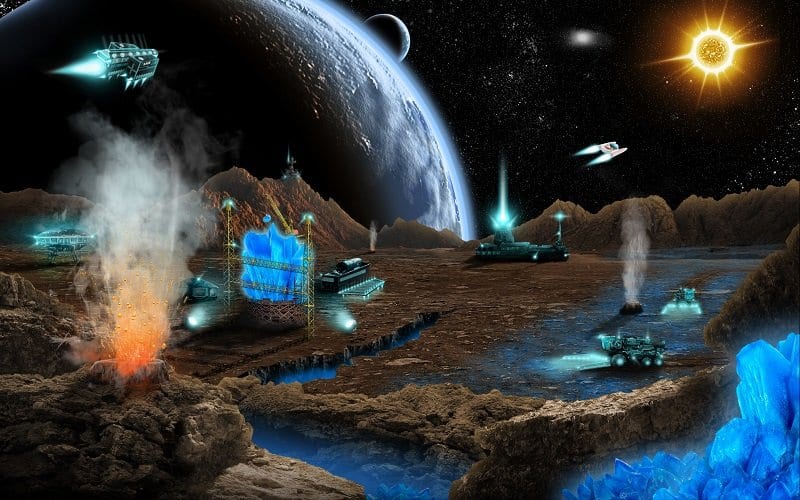Will AI-enhanced robots shape the future of humanity?
Introduction
Artificial intelligence (AI) is developing at an incredible rate and is rapidly catching up with human intelligence (HI). From the development of single-purpose narrow artificial intelligence (ANI) to artificial general intelligence (AGI), intelligent robots that can think, act, and make decisions with or without humans on earth and beyond are soon to be a reality. As serious plans are made for more moon missions, asteroid mining, and space colonization, the arrival of intelligent space robots will be useful for not only gathering information about our universe but also doing tasks such as building spaces for human habitation beyond earth.
There are visible indicators that for space exploration humans will rely on intelligent systems in many shapes, sizes, and structures. In general, robots embedded with artificial general intelligence seem to be at the heart of space exploration and colonization. This raises the question: why are AGI-embedded space robots the preferred explorers for scouting the unknown space terrain?
The reason behind this is that they bring the physical strength and resilience that we need to explore the unknowns. Moreover, they can survive only on one energy source and can have a long operational life. The ability of intelligent space robots to survive in any atmospheric and environmental condition is also crucial. Hopefully, these AGI-embedded space robots will be able to self-replicate using raw materials available on other planets, giving them the numbers we need to explore the galaxy and the ability to work towards the goals we define for the benefit of humanity.
It is therefore essential to understand (i) what role AGI will likely play in future space exploration and (ii) whether we will have the necessary controls embedded in AGI that will prevent intelligent robots from going off track and becoming dangerous.
Acknowledging this emerging reality, Risk Group initiated a much-needed discussion on Artificial General Intelligence for Robotic Colonization of Space with Alok Gautam, Co-Founder, and CEO of Olbrain based in the United States on Risk Roundup.
Risk Group discussed Artificial General Intelligence for Space Robots with Alok Gautam, Co-Founder, and CEO of Olbrain based in the United States.
So, as we look to colonize space with AGI-embedded robots, the question is: what is the level of intelligence necessary for robot colonization to succeed? And have we reached that capacity in machines?
AI Systems for Space Exploration
The fundamental ability of AI to sort through massive amounts of data to find correlations and patterns is becoming increasingly important. Since AI is driving space exploration, it is crucial to understand where it is being applied for space endeavors.
It seems AI has already played an essential role in assisting humans in researching space and the universe. It is also being developed for use in emerging space applications for many space missions. From research about planets, the solar system, and the universe, artificial intelligence is already proving foundational.
For example, AI is used for collecting data about the environment. It is already being used for taking images, trajectory, and payload optimization. Not only that, but AI is also being used to optimize analysis of and responses to natural occurrences, like floods, volcanic eruptions, and for the classification of new objects discovered. AI systems have also helped astronomers to identify many new possible gravitational lenses that play a crucial role in connection with research into dark matter. The data from some Mars rovers are being transmitted using AI, and these rovers have even been taught how to navigate by themselves. An AI system has also proven its capability in handling autonomous targeting of cameras to choose what to investigate on the red planet. An AI system known as AEGIS is already on the red planet onboard rovers. Moreover, AI is also aiding astronauts on board the International Space Station.
Also, for missions that may be too dangerous for humans to undertake, intelligent systems embedded in robots are already being used. Reports have emerged that the first AI-equipped machine has already flown to space. CIMON, a Crew Interactive Mobile Companion Robot endowed with AI, has already been launched on a trip to the International Space Station. Plans are being reported for launching a telescope into an orbit of around 1.5 million kilometers from Earth.
Moreover, machine learning algorithms are also used for monitoring spacecraft, autonomous navigation, intelligent control systems, intelligent object detection for path navigation, and more. Machine Learning (ML) systems are also commonly used in space applications to approximate complex representations of the real world and to analyze the enormous amount of data that comes from each space mission.
That brings us some important questions: As we prepare to explore Mars and the Moon, what is required to ready intelligent systems? And what kind of AI-empowered autonomous systems are essential for emerging space missions and potential colonization?
Robotic Colonization
While humans would be vulnerable to solar and cosmic radiation, would need to deal with changes in gravity, and would also require oxygen, water, food, and much more, robots would require almost nothing and can sustain on perhaps just a single energy source. There is also a hope that if we don’t find an Earth-like planet, robots can perhaps terraform and slowly create an Earth-like atmosphere by engineering the environment. As a result, robots seem to be the future of space exploration and colonization.
That brings us an important question: what would artificial general intelligence embedded robots need to be able to do? They will need to read and process data, reveal anomalies, recognize structures, control vehicles, navigate autonomously, perform automated telemetry analysis, update software, and more. Moreover, communication with Earth and humans will also be vital for robots. So, what is the state of advances in artificial general intelligence for space endeavors?
Artificial General Intelligence (AGI) for Space Endeavors
While developing AGI for space is currently a work in progress, it faces many complex challenges. On the technical level, processing power, as well as data storage and management, are limiting factors. It seems computing power is also another challenge, and it is crucial to understand and evaluate what kind of computing power we will need for space exploration. Moreover, there is no way to foresee the nature of security risks that will emerge due to self-modifying code and self-modifying intelligent robots. Thus, defined and designed controls must be embedded in artificial intelligence to prevent algorithm evolution that goes against human interests.
As Alok Gautum notes in Risk Roundup: “…if we are giving [robots] the ability to decide on their own, then we need certain control functions also because they may think of anything that may not be desirable to humans. So, these control functions are going to be very tricky because they are overlapping, they are contradicting with each other, and they can contradict without their own central objective function. This is the biggest challenge, even if the technology is ready. What are we supposed to build? That we need to decide.”
What Next?
Robot colonization is coming. As we plan space colonization using robots embedded with artificial general intelligence that would have self-modifying code and goals, the question we all need to evaluate is whether we can define and design controls to prevent AI from going off track. Will it be safe for the future of humanity?
NEVER MISS ANY OF DR. PANDYA’S POSTS
Join here for a weekly update.





 How Artificial Intelligence Is Transforming Business
How Artificial Intelligence Is Transforming Business